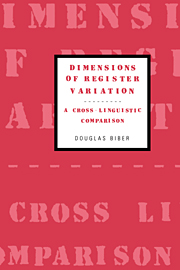Book contents
- Frontmatter
- Contents
- List of figures
- List of tables
- Acknowledgments
- List of abbreviations
- 1 Introduction
- 2 The comprehensive analysis of register variation
- 3 Sociocultural description of the four language situations
- 4 The linguistic bases of cross-linguistic register comparisons: a detailed quantitative comparison of English and Somali registers
- 5 Methodology
- 6 Multi-Dimensional analyses of the four languages
- 7 Cross-linguistic patterns of register variation: synchronic similarities and differences
- 8 Cross-linguistic patterns of register variation: diachronic similarities and differences
- 9 Registers and text types in English and Somali
- 10 Towards cross-linguistic universals of register variation
- Appendix I Grammatical description of linguistic features in Korean. Yong-Jin Kim
- Appendix II Grammatical description of linguistic features in Somali. With Mohamed Hared
- Notes
- References
- Index
8 - Cross-linguistic patterns of register variation: diachronic similarities and differences
Published online by Cambridge University Press: 07 September 2009
- Frontmatter
- Contents
- List of figures
- List of tables
- Acknowledgments
- List of abbreviations
- 1 Introduction
- 2 The comprehensive analysis of register variation
- 3 Sociocultural description of the four language situations
- 4 The linguistic bases of cross-linguistic register comparisons: a detailed quantitative comparison of English and Somali registers
- 5 Methodology
- 6 Multi-Dimensional analyses of the four languages
- 7 Cross-linguistic patterns of register variation: synchronic similarities and differences
- 8 Cross-linguistic patterns of register variation: diachronic similarities and differences
- 9 Registers and text types in English and Somali
- 10 Towards cross-linguistic universals of register variation
- Appendix I Grammatical description of linguistic features in Korean. Yong-Jin Kim
- Appendix II Grammatical description of linguistic features in Somali. With Mohamed Hared
- Notes
- References
- Index
Summary
A register perspective on historical change and the linguistic correlates of literacy
The studies discussed in chapters 6 and 7 have all been synchronic, identifying the dimensions of variation in four languages and describing the systematic similarities and differences among present-day registers in terms of those dimensions. This same analytical framework can be used to study historical change among registers, using the previously identified dimensions of variations to address two major research issues:
the linguistic development of an individual register – comparing the linguistic characteristics of a register along multiple dimensions across time periods;
historical change in the relative relations among registers – the diachronic patterns of register variation. For example, do spoken and written registers develop in parallel or divergent ways? Over time, do they become more similar or more distinct?
Investigations of this kind are especially important for literacy issues, considering the ways in which a language changes following the introduction of literacy and the early development of written registers. Specific research questions of this type include:
What are the linguistic characteristics of written registers when they are first introduced into a language? What linguistic models were used for written registers at that historical stage? Did written registers evolve from pre-existing spoken registers, from similar written registers in other languages, or from other sources?
How stable are written registers in the early stages of evolution? In what ways do they develop, and what are the motivating factors influencing change?
Do written varieties evolve independently or in shared ways? Do they evolve at a constant or variable rate? Do they evolve over time to become more different from spoken varieties and from one another?
- Type
- Chapter
- Information
- Dimensions of Register VariationA Cross-Linguistic Comparison, pp. 280 - 313Publisher: Cambridge University PressPrint publication year: 1995



